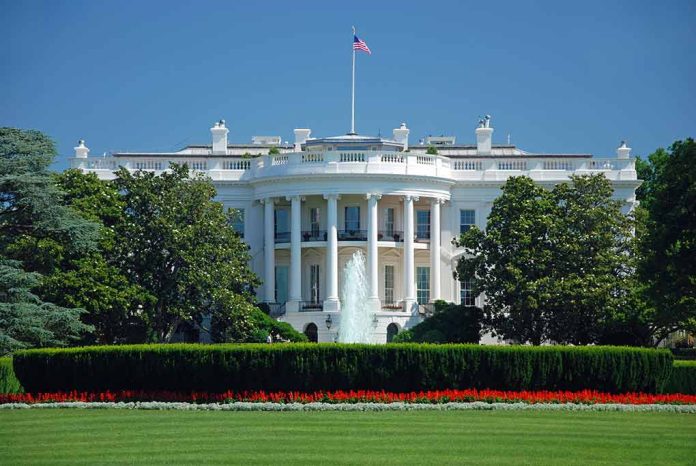
President Trump sparks constitutional debate by declaring he’s “not joking” about pursuing a third term despite clear restrictions in the 22nd Amendment.
Key Takeaways
- Trump has expressed interest in a third presidential term, claiming “there are methods” to bypass the 22nd Amendment’s two-term limit.
- Changing term limits would require a constitutional amendment with two-thirds congressional approval and 38 states’ support.
- Trump suggested running as vice president with a running mate who would step aside after winning, though legal scholars are skeptical of such loopholes.
- Trump’s current approval rating stands at 47.9%, higher than at any point during his first term, according to RealClearPolitics.
- Some allies, including Rep. Andy Ogles and Steve Bannon, have publicly supported the idea of Trump pursuing additional terms.
Trump’s Third Term Ambitions
President Donald Trump has sparked controversy by openly discussing the possibility of seeking a third presidential term. During recent public appearances, Trump stated he was “not joking” about pursuing additional time in office. The 22nd Amendment explicitly limits presidents to two terms, making Trump’s suggestions particularly noteworthy. His comments have ignited debate about constitutional boundaries and presidential term limits that have stood since 1951 when the amendment was ratified following Franklin D. Roosevelt’s unprecedented four-term presidency.
Trump cited growing public support as motivation for considering a third term, stating, “A lot of people want me to do it.” He referenced his current popularity, noting that his approval ratings are higher now than during his first presidency. The president has suggested there might be “methods” to circumvent the constitutional restrictions, though he declined to elaborate on most of these potential approaches. These statements have raised questions about whether Trump is serious about challenging established constitutional norms or simply energizing his base with provocative rhetoric.
Trump should absolutely not run for a third term.
It opens a huge can of worms.
We don’t want Democrats doing that if they are in the presidency.
I doubt there will be public appetite for it anyway. https://t.co/PzLy9SwUFI
— Cryptid Politics 🇺🇸🐊 (@CryptidPolitics) March 30, 2025
Proposed Methods and Constitutional Hurdles
One approach Trump mentioned involves running as vice president with a running mate who would step down after winning the election. When asked about this scenario, Trump responded, “That’s one method.” Constitutional scholars, however, have expressed significant skepticism about the viability of such plans. The 22nd Amendment states that “no person shall be elected to the office of the President more than twice,” creating a substantial legal barrier to any attempt at securing a third term through procedural maneuvers or loopholes.
Altering the Constitution would require a formal amendment process, including approval from two-thirds of both houses of Congress and ratification by 38 states. This high threshold makes any change to the two-term limit extremely difficult to achieve. Some Trump allies have nonetheless begun exploring potential avenues. Representative Andy Ogles of Tennessee proposed a resolution to extend presidential term limits, though such measures face significant hurdles in the deeply divided Congress. Steve Bannon, a longtime Trump associate, has also expressed belief that Trump could run and win in 2028.
Political Implications and Public Response
Trump’s comments about seeking a third term have elicited mixed reactions across the political spectrum. Whether Trump’s comments about a third term represent serious political ambition, trolling or strategic messaging remains unclear. Critics, however, have expressed concern about the implications for democratic norms. Harvard Professor Steven Levitsky has suggested that Trump’s rhetoric and actions represent a concerning trend toward authoritarian governance where democratic institutions could be gradually weakened.
While Trump continues to hint at potential workarounds, the practical reality of implementing such plans would face intense legal scrutiny and political resistance. For now, Trump maintains he’s focused on his current term while keeping the door open to future possibilities that would challenge America’s long-standing constitutional precedents.









